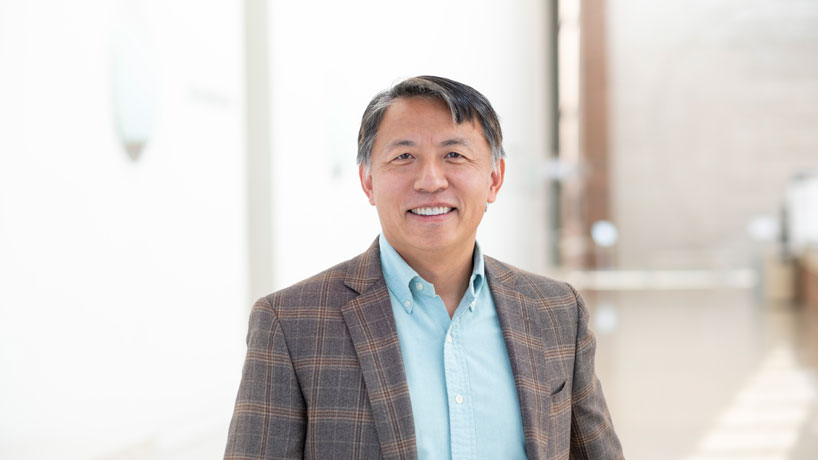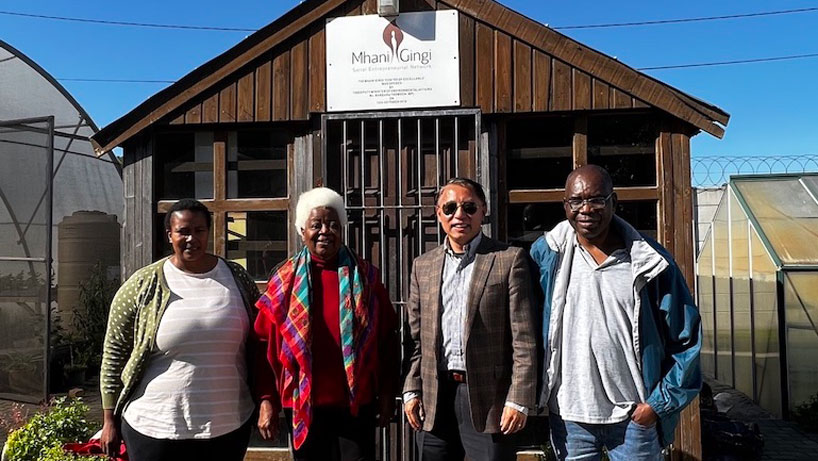
Haitao Li is assisting two farms in South Africa with supply chain issues and operations to help them achieve sustainability through the UM System/UWC Faculty Exchange Program. (Photo by August Jennewein)
Tabisa Mahlathi lives in Cape Town, South Africa, and earned a degree in environmental science before landing a job at the Mhani Gingi farm in the Western Cape.
She was promoted from nursery assistant to project coordinator, training the gardeners, monitoring the gardens and taking produce orders. The opportunity helped her pay her mother’s medical bills and eventually buy a house for her family.
The Mhani Gingi farm has assisted others like Mahlathi with achieving financial stability, and now it, along with Middlepos – another farm that also serves those who are marginalized and disadvantaged in the nearby villages of Cape Town – needs assistance to become a sustainable resource for its community.
That’s what Haitao Li is attempting to provide.
Over the summer, while some professors were enjoying well-earned breaks, Li, a professor and chair of the Department of Supply Chain and Analytics in the University of Missouri–St. Louis’ College of Business Administration, traveled to the Western Cape of South Africa to assist the two farms with their supply chain and logistics challenges.
Supported by the University of Missouri System and the University of the Western Cape Faculty Exchange Program, Li partnered with UWC information systems Professor Osden Jokonya to develop data-driven solutions to address the farms’ gaps in agribusiness supply chains and difficulties with agriculture.
The two met three years ago when Jokonya visited UMSL, and they stayed in touch. When Li expressed interest in doing a research project on agribusiness supply chain in South Africa, Jokonya suggested the two farms. The exchange program provided the opportunity, and Jokonya served as Li’s host at UWC.
The two have embarked on a yearlong project that speaks to the mission of the UM System/UWC Faculty Exchange Program, which is to advance mutual understanding and demonstrate cooperation in teaching, research and service among the faculties of the UM System and UWC in Cape Town, South Africa.
Li believes the farms have the potential to be even more viable and is enthusiastic about helping them achieve effective growth.
“They’re missing a lot,” Li said. “They do not have a sound business plan, marketing or branding efforts. And some of their products are of high quality, especially the Middlepos farm, a much bigger farm. They produce a variety of products including olives. The olive trees are really impressive. They’ve got lots of land – over 50 or 60 acres of land. They also grow high quality grapes and send them to one of the local vineyards. Wine is a big industry in South Africa. But the fact was, their margin is very, very tiny compared to how much wine is sold in the market.”
The changes needed to provide sustainability to the farms are complex.
“Supply chain is a very comprehensive concept and practice,” Li said. “Moving goods from one point to the other is certainly one aspect, but there are many other issues. For example, matching their supply with the demand is another one. And this question is also very important for the two farms I was able to visit because, as we all know, the food and agriculture sector has a significant seasonality factor. So this influences the demand, and the price fluctuates. That’s why, especially for these small or medium-sized farms, it’s very important for them to determine the right produce to grow at the right time.”

Haitao Li visited South Africa this summer and met (from left) Tabisa Mahlathi, a project coordinator at the Mhani Gingi farm; Lillian Masebenza, founder of the Mhani Gingi Foundation; and Osden Jokonya, a professor of information systems at the University of the Western Cape. (Photo courtesy of Haitao Li)
Other challenges include figuring out product distribution, supplementing dwindling government funding, utilizing limited space and finding workers in a labor force reduced by the Covid-19 pandemic.
Li, who has a master’s degree in economics and a PhD in production and operations management, understands these stark difficulties and knows they will not be solved quickly. He has dedicated the next year to researching solutions and working with Jokonya on a business plan to maximize the farms’ productivity. He plans on going back to South Africa next summer, when it will be winter in the Southern Hemisphere, to present the research findings and proposal.
“I’m hoping we can we can present some prototype the farms can use to improve their operation,” he said.
Getting the farms up to speed will be a great boon to other women like Mahlathi and the broader community.
Though this project will have an effect abroad, Li points out its relevance to UMSL and the St. Louis region, citing the global issues of logistical barriers, fuel and transportation increases and climate change that affect agricultural sustainability.
“The impact of this line of research is important for our supply chain and analytics department because Missouri has a big agriculture and natural resource sector, as well as forestry,” he said.
“We are the largest public research university in the region. I feel it is our burden and responsibility to support the agribusiness industry in Missouri and certainly on the broader scope. Many of the challenges we are addressing here are not limited to our state, they’re worldwide.”














